[ad_1]

New Delhi:
How has India formed the G-20? How has the G-20 presidency formed India’s international future? Watch NDTV’s mega conclave that brings the most important names behind India’s G-20 success on one stage. Join us for a day-long occasion in the present day, the place we decode power transition, clear development, digital economic system and India’s huge international second.
Here are the Highlights On NDTV’s G20 Conclave:
Get NDTV UpdatesTurn on notifications to obtain alerts as this story develops.
#DecodingG20WithNDTV | “I love Indian food. Dal Bati in Jodhpur and some Churma, Rasgulla at KC Dass (Kolkatta). Fish curry in Goa. I love the music too”: UK Envoy Alex Ellis
Watch different viral moments from in the present day’s conclave on https://t.co/ABU4LmjIWo, together with a particular salute… pic.twitter.com/rNlcjizU3k
– NDTV (@ndtv) August 26, 2023
“We are nowhere near where developed countries are, like France which has 55% energy coming from nuclear. We ensured that any person can use solar panels. Government gives 40% subsidy up till 3 KW for such solar panels, and 20% for 3-10KW – with net metering. All bankers must also give loans for this. We are also going to put up hoardings for it,”
“We are the only country that has achieved its Nationally Determined Contributions (NDCs) in advance. We have 43.5% energy coming from non-fossil fuels. Our total capacity by 2030 will be 770 GW. This, despite being the lowest emitter. Every developing country including the Global South has a right to grow. Growth entails consumptions and emissions. You can’t phase out fossil fuels until you have round the clock renewable energy. Net zero has questions – Storage is expensive. The developed world talks about climate, but did not say anything about capacity,” RK Singh, Minister for Power, New & Renewable Energy.
“Our renewable energy capacity is growing faster. Today, 73% energy comes from fossil, not just coal but also gas. We have increased our renewable energy capacity 2.5 times in 9 years,” RK Singh, Minister for Power, New & Renewable Energy.
“Energy savings certificate programme has helped in reduction in CO2 emissions. We are a world leader in energy savings and transition. Climate change is a challenge which is looming,” he mentioned.
“If you say fossil fuel should be stopped entirely, then supplying 24X7 electricity will be difficult. Our rate of renewable energy capacity is the fastest in the world. India’s power demand grew at 6.7% 2020-2021, 6.3% between 2021-22, 7.1% in Q1 of 2023-24, 9% in July. Our per capita emission 2.91 tonnes per year whereas the global average is 6.4 tonnes. Ours is one third of global average. We are among the lowest emitters in the world. We have achieved our climate commitments 9 years before due date,” RK Singh, Minister for Power, New & Renewable Energy.
“I loved the food. Dal bati in Jodhpur and some churma, rasgulla at KC Dass. Fish curry in Goa. I love the music too,” he mentioned.
“It is India’s golden moment. In this golden moment, India can appeal to the psychology of capital, investments will create jobs, boost GDP. This will help India become perhaps the largest economy in the world,” Atul Keshap, former US Envoy to India
“India tops all three visa categories in UK – students, visits and skilled workers. Did you ever imagine a person living at 10 Downing Street on August 15 say Jai Shri Ram? Lord Curzon would have choked,” Alexander Ellis, UK’s High Commissioner to India
“I think United Nations Security Council will benefit from having India on board. The pace of revolutionary change in the lives of Indian people is amazing. India will shine on the global stage in the next 30-40 years and make the world better,” Atul Keshap, former US Envoy to India
“The Ukraine war must end and we must focus on ending human suffering. India has been exceptionally generous towards its neighbours. Countries have to develop closer relations. India and US are reacting in a very constructive and positive way to challenges,” Atul Keshap, former US Envoy to India mentioned.
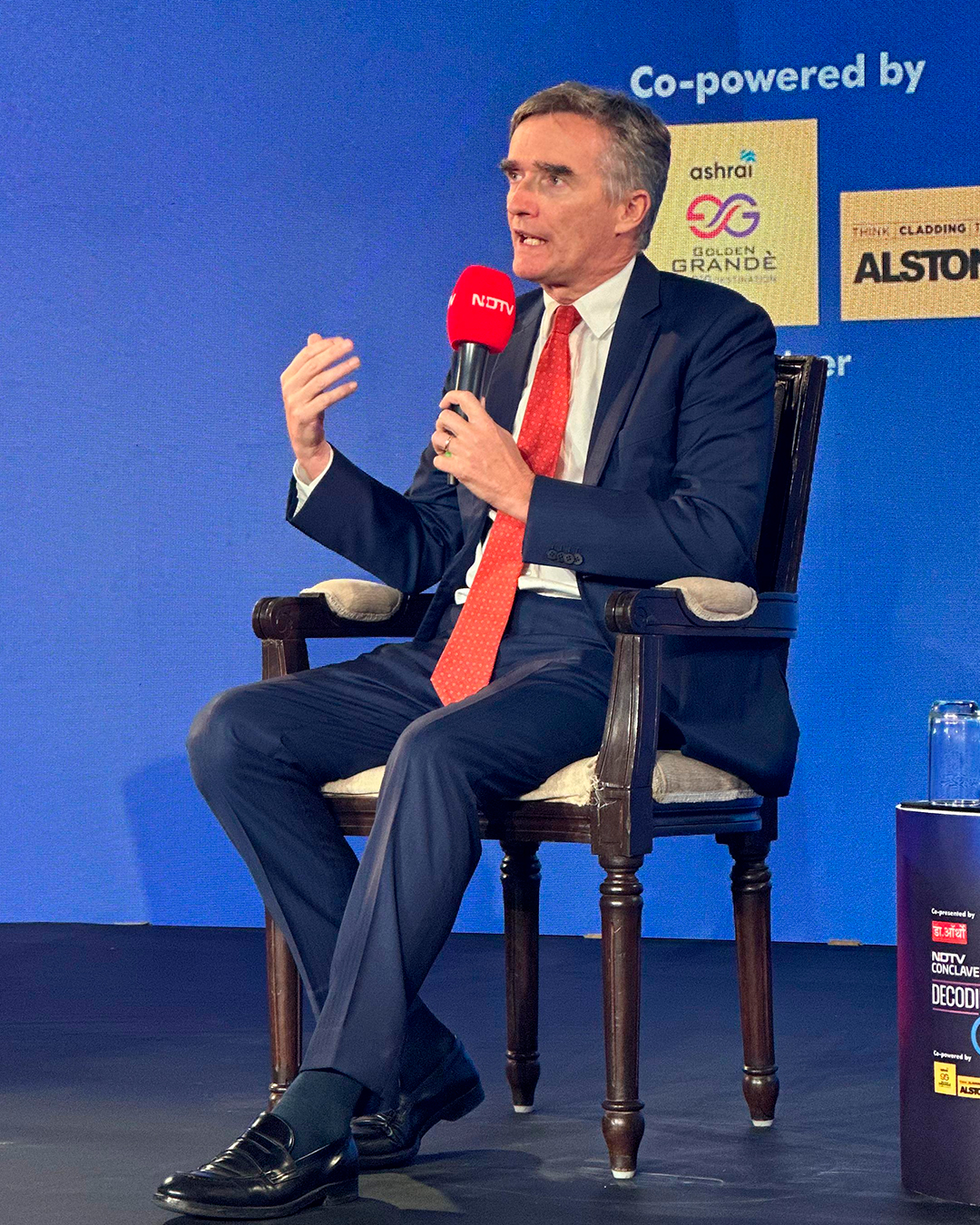
“India has broken the mould how to do the G20 presidency – the scale and ambition to tackle big problems of the world, like global hunger, low growth and poverty,” Alexander Ellis mentioned.
“What India is doing for its citizens is scalable for all countries around the world. The Indian vision for G20 also focusses on future freedom and happiness,” Atul Keshap mentioned.
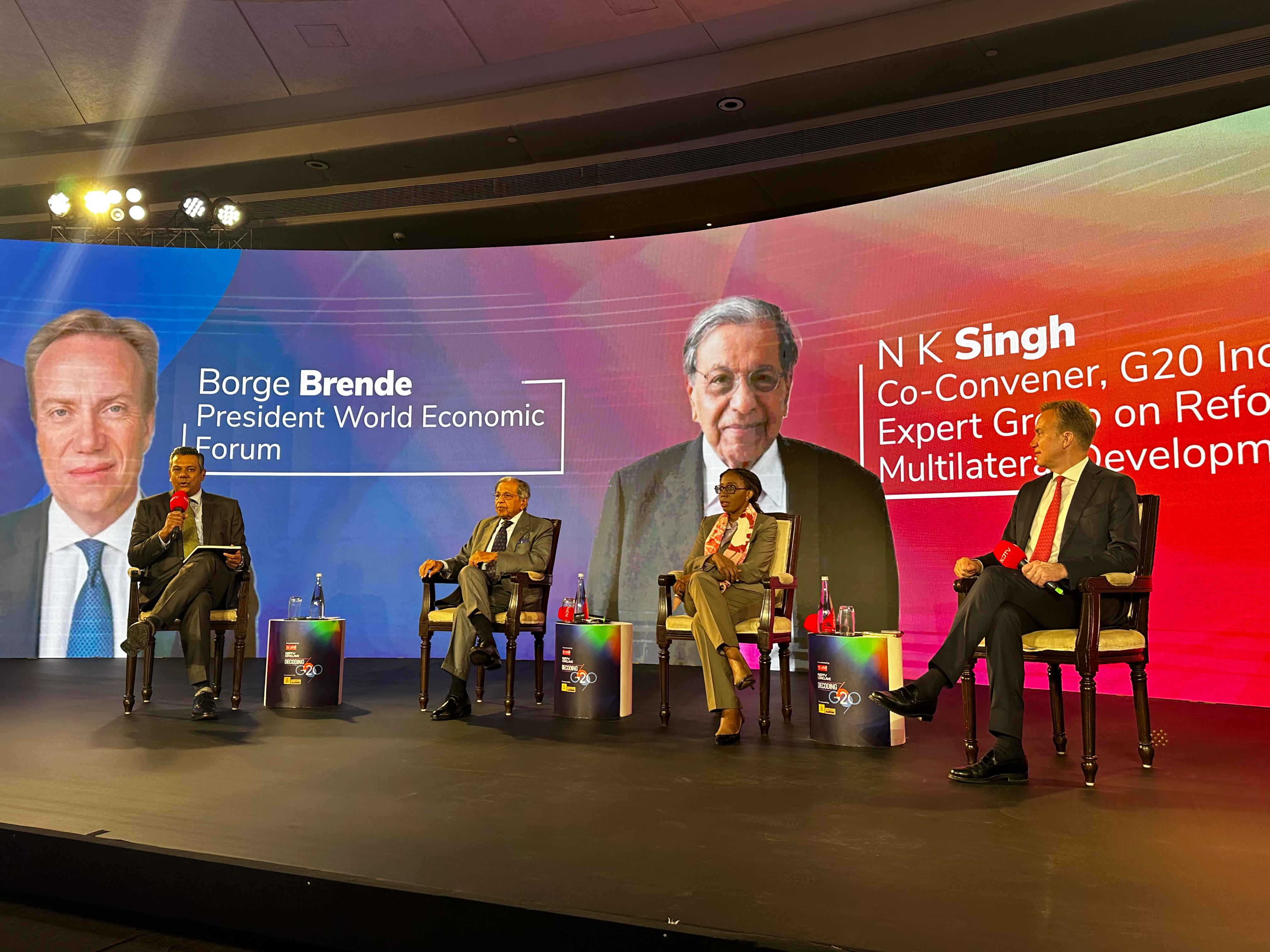
“India Is Doing So Well Because…”: Vera Songwe At NDTV Conclave
“Digital economy and climate economy will create a lot more jobs if we reskill people. They will not destroy jobs. India is doing so well because it has done the capacity bit along with IT bit,” Vera Songwe mentioned.
“I continue to see India as a prime mover, catalytic, and important destination for startups. Technology is both an enabler and destroyer. We are undergoing a period of readjustment,” NK Singh mentioned.
“Climate change is happening here and now, and we are paying a price. It’s affecting agricultural production. We are not seeing enough action. India’s G20 presidency underlines the need for a faster decarbonisation,” he mentioned.
“From macro economic perspective, digital access is also growth disruptor. How is India the fastest growing economy? It is because when economic models do not work we need a disruptive factor, which is technology,” he mentioned.
The panelists are Borge Brende, President World Economic Forum together with N Ok Singh, Co-Convener, G20 Expert Group On Reforms In Multilateral Development Banks and Vera Songwe, Brookings Institution Chair And Founder, Liquidity And Sustainability Facility, Africa Growth Initiative
Borge Brende mentioned “India digitalisation and connectivity is amazing. This is big advantage for India movingn forward.”
“What India is doing with Aadhaar program is about including people in financial sector. When we have more information they can join formal economy. If we don’t have that globally we cant get the kind of growth needde to come out of crisis,” Vera Songwe mentioned.
“The big challenge is going to be mass employment and we have to look at lower levels of manufacturing that can provide mass employment. We must also focus on that along with the high tech,” she mentioned.
“India quite well placed. There is general stagnation in the world. Even China is slowing down. India’s opportunities have grown,” C Rajamohan mentioned.
G20 NDTV Conclave Live: Meera Shankar On Climate Change Financing
“The pledge of 100 billion dollars has not been fulfilled (for climate financing). If we look at private financing for climate change, then it’s not available sufficiently, costs are much higher in developed world,” Meera Shankar mentioned.
Responding to a query from the viewers on why Russian President Vladimir Putin is not going to attend the G20 summit in India subsequent month, Meera Shankar mentioned, “I believe Putin is under pressure due to Ukraine, and also anticipates pressure from Western bloc if he comes.”
“I fear China issue might overshadow the G20. It’s a very complex dispute but something seems to be cooking,” mentioned C Rajamohan.
China’s coverage says it should assert sovereignty on each inch of disputed territory. This units up battle as a result of these are areas which have conflicting claims. If the problem must be settled primarily based on one facet’s claims, this doesn’t depart room for assembly grounds. The larger query is how can we construct new belief or confidence or settle the boundary,” said Meera Shankar.
“PM Modi and Xi Jinping have been anticipated to work together earlier than G20. India’s technique and public temper have additionally developed, which is necessary in a democracy. I do not assume the India-China challenge could be introduced again,” mentioned Ashok Malik.
“What India has completed is create a spread of different areas the place agreements could be produced- by pushing a various entrance and to get some believable agreements. The trick and success can be to nonetheless get a joint assertion. The commerce ministers assembly appears to offer some hope. There is room nonetheless for some hope for the subsequent few days,” he mentioned.
“It made folks conscious that overseas coverage impinges on their day-to-day life. If the power transition is made sustainable, that will affect the every day life of individuals. What we negotiate in free commerce pacts impacts small industries. We ought to take into accout the long-term affect of such negotiations,” said Meera Shankar.
“Indo-Pacific has changed Euro-Atlantic because the locus of world economic system. We usually are not in a multi-polar or bipolar world but, by the top of this decade we can have a transparent reply,” mentioned Ashok Malik.
The panelists on stage are Meera Shankar, Former India Ambassador to the US, Ashok Malik, Partner & Chair, The Asia Group and C Rajamohan, Senior fellow, Asia Society Policy Institute.
“The time G20 was arrange, it was type of the heyday of globalisation. Now we’re seeing extra nationalistic financial insurance policies and protectionism. India had a really unenviable activity to forge a consensus however it took the problems head-on and formed the agenda,” said Meera Shankar.
“Every decade in overseas coverage offers you some shocks. These final 3-4 years have already given three shocks- Covid, the Ukraine conflict, and a transparent geopolitical divide between US and China,” mentioned Ashok Malik.
“All creating nations and a few 125 nations are there and we organised the Voice of Global South Summit earlier than G20 to debate broad priorities. We have seen that Global South’s considerations about meals safety, power, and inflation are getting uncared for as a result of engagement of developed nations within the Ukraine War, and subsequently India’s presidency is a hope for them,” Mr Shringla mentioned.
“The imaginative and prescient of PM Modi is to convey the worldwide group, particularly the worldwide south, collectively.
“We are today in a very divided geopolitical order. We are fortunate to deal with our partner nations and our endeavor is to deal for the larger good or mankind’s success, something that is reflected in our G20 theme. We want inclusivity like Africa has 54 countries but is not represented in the UN adequately. PM Modi has insisted on the African Union’s representation
“Our place on growing UNSC illustration has all the time been there and we even mentioned this in the course of the SCO and BRICS summits and we wish the world order to be representational. In BRICS our companions additionally agree for extra illustration in UNSC,” Mr Shrigla mentioned.
“Our G20 presidency has come at a tough time and the affect of the 2 has been felt throughout the globe, particularly the worldwide south. We need to understand that worldwide organisations must be coping with conditions just like the UN however they haven’t been on top of things attributable to an absence of illustration. Smaller groupings like G20 with illustration have been efficient and for a lot of nations, India’s presidency is a ray of hope. This is a chance to offer options to challenges,” he mentioned.
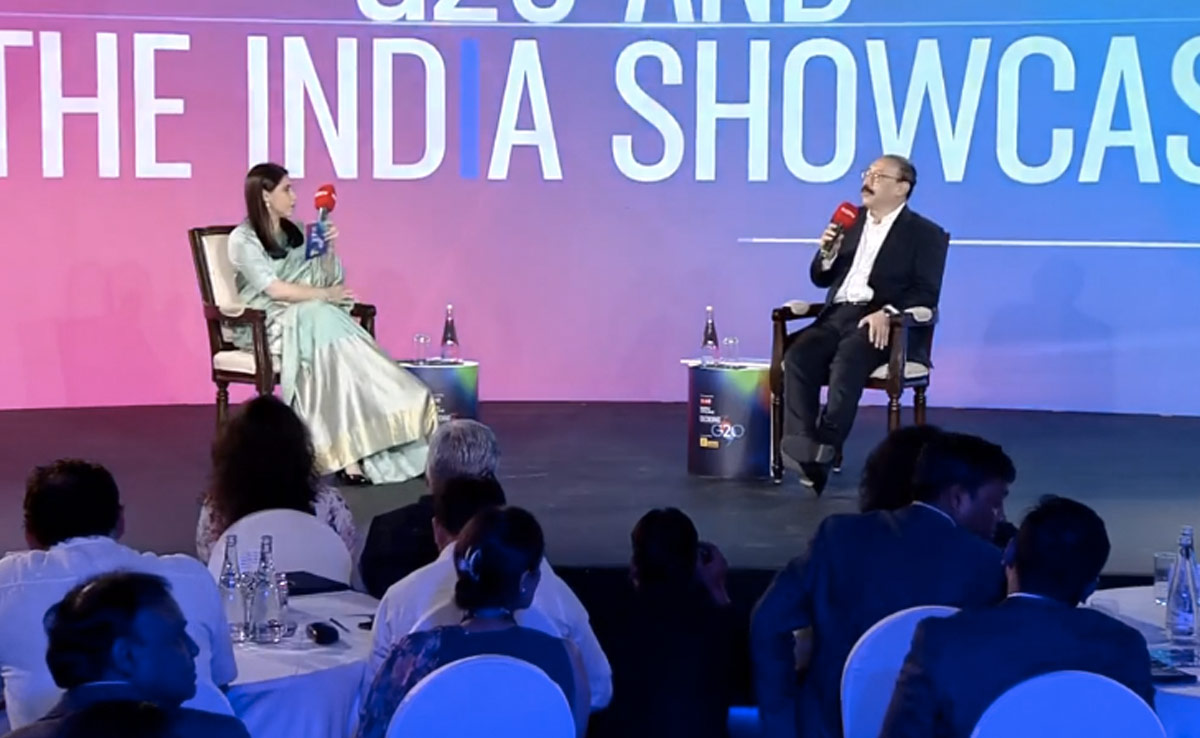
Harsh Vardhan Shringla, Chief Coordinator for India’s Presidency of G20 on stage to talk about G20 and ‘The India Showcase’.
“India’s area economic system stands at $8 billion however your entire world is recognising it. It could be $100 billion by 2040. Funding can be occurring after opening up for personal gamers. We have a National Research Foundation now, which is closely tilted in the direction of non-government sources like non-public gamers, CSR, and philanthropy. That’s how NASA has grown. The National Research Foundation will likely be outcome-oriented,” Dr Singh mentioned.
“Most scientists are from regional schools. Like Trivandrum Institute has 100% placement file. With area getting unlocked in 4-5 years, there are a lot of alternatives that may be unlocked,” Dr Singh mentioned.
“The mission received delayed as a result of pandemic. Now we’re planning the primary trial mission within the first or second week of October. Bringing the astronauts again is as necessary as sending them. In the second mission, there will likely be a feminine robotic. She will mimic all human actions and if every thing goes completely then we will have a go-ahead.
“An Indian space station can happen but I can’t give any schedule for that,” Dr Singh mentioned.
“Those who have been very closely associated with the ISRO team were nervous. My first nervous moment was when Chandrayaan-3 left Earth’s orbit for the moon’s orbit. The landing was so smooth.
“It’s been a quantum leap and it has occurred by PM Modi throwing open the area sector. Till about 2019, the gates of Sriharikota have been closed however this time media, and schoolchildren have been invited. It was owned by folks however this time. PM Modi broke the taboos. There has been a rise in funding. Now there are a lot of startups which might be making a fortune out of it along with constructing the area economic system,” Dr Singh mentioned.

“No ban on laptops, there is not any License Raj; our communication was unhealthy. We don’t need any tools coming into the nation which is something aside from trusted. Most laptops are manufactured in a selected nation and we do not need any dependency. We need Made In India merchandise and stuff that’s trusted by us and if you wish to import it then it must be from a trusted supply. We don’t do something that will disrupt our digital economic system. We need trusted supply tools. We do not wish to be ready like many Western nations the place 80% of kit has a doubtful supply,” Mr Chandrashekhar mentioned.
“India’s method to privateness has been completely different from its European counterparts. Their method is extra prescriptive. Our method is extra citizen-centered and principle-based. I feel they’re signalling that they wish to be prescriptive.
“Internet shutdown or lawful shutdown is not unique to India. The UK also does that. It happens when fake news travels faster than real news and can create a law and order situation. The Internet was earlier seen as a power for good; there is now weaponisation of the internet through misinformation like Pakistan’s DGISPR, Khalistani bots, etc. Internet shutdown is the last resort to deal with misinformation. Singapore has come up with a very tight discussion. If we figure out a way to make the internet safe and trusted then there’s less need for takedowns,” Mr Chandrashekhar mentioned.
“Digital personal data protection bill has a twin objective – to put the break on misuse and exploitation and to create symmetry in relation by addressing the asymmetry.
“Powers given to the Centre are very narrowly outlined. In India, privateness is a basic proper however not absolute. For nationwide safety, pandemics, and pure disasters authorities has to discharge responsibility and it wants some energy,” Mr Chandrashekhar mentioned.
“As we digitise and transfer from 30 crore Indians on-line to 80 crore Indians on-line now. Cyber safety is a problem. As a lot because the web represents good, there are unhealthy actors, there’s misuse that takes place,” Mr Chandrashekhar mentioned.
“We usually are not actually implementing any India mannequin however turning the pinnacle that tech was for wealthy nations and we have now to run to Big Tech for that. We wish to flip the narrative that India DPI is open supply, nobody owns it and it is for the folks. The UPI is an answer to unravel corruption and leakage. PM Modi got here with Jan Dhan Accounts, DBT, after which UPI developed. It’s a vibrant ecosystem.
“One big difference between how tech has been viewed in post and pre-2014 India. Pre-2014, it was about jobs, investment and just a part of the general economy. Post-2014, there’s a conscious effort to include tech in governance. In nine years, we have spent Rs 5-6 lakh crore in e-governance. Post-2014, we had a leader to use max tech in governance. Now we have Aadhar, UPI, DigiLocker and if that vision had not been in place, during Covid, we could’ve had a very difficult time. It helped us a lot during the pandemic,” Mr Chandrashekhar mentioned.
“One of the amazing things about India’s G20 presidency is how DPI is at the centre stage, even during Pre-G20 presidency. DPI has transformed the ecosystem and transformed the lives of people, especially in the post-covid world. The vision PM Modi had in 2015 was that tech can transform lives. DPI was the vision of PM Modi and we have demonstrated that through a win-win situation with the private sector with people at the centre and we want to expand the DPI structure in the public ecosystem,” he mentioned.
“PM Modi in 2021 said he wanted AI to build for DPI and therefore AI for governance has become important. There are countries lining up to take the open-source tech and customise it,” he added.
Rajeev Chandrashekhar, Honourable Minister of State for Electronics and Information Technology, on the stage for his speak on Digital Economy.
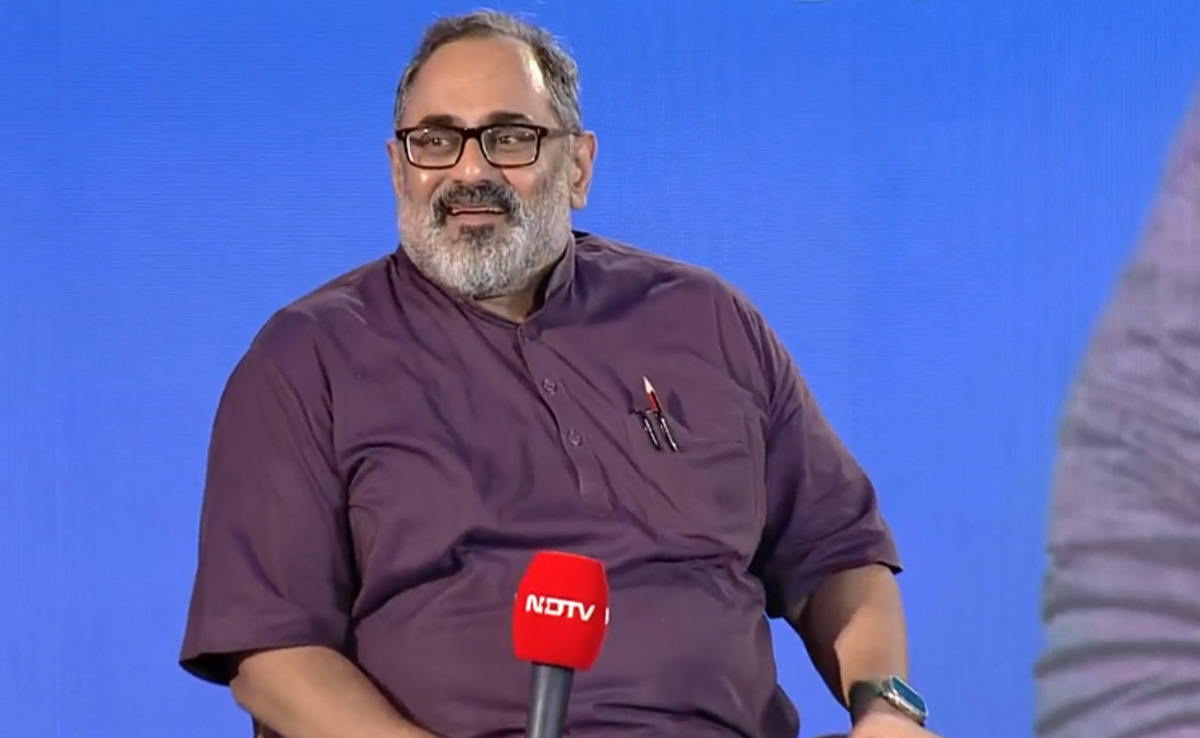
“In 2021, in his address from Red Fort, PM Modi talked about adopting Green Hydrogen, and many questioned it. There is a trend – completely end fossil fuels. If you want to end fossil fuels then invest in renewable energy,” he mentioned.
On Fuel Consumption and Climate Change: “It is very easy to go around polluting the world and give prescription to the world (developed countries to developing countries). “
“Earlier getting gas cylinders was difficult and women used coal to cook food and it was toxic. We moved from there. The Ujjawala scheme gave 9 crore gas cylinders. The person who is most vulnerable is of the highest priority,” he mentioned.
“In 2014, the gas pipeline was 14,500 km. Our target is 33,000 km. Natural gas usage in the economy will go up. We are trying to increase production.
“LPG connections are going up, and CNG connections have additionally gone up. thought is to extend the connection. The gas of the long run is inexperienced hydrogen. People may not wish to use fossil fuels 20 years from now as a result of there will likely be choices. Green Hydrogen will succeed when there’s home demand and home manufacturing.
“By 2025, we’ll have an interesting situation, We’ll have 20% bio blending and we’ll shed our inhibition. The number of cars on CNG is going up and in many ways, it represents India story,” Mr Puri mentioned.
“You’re rethinking fuel and also providing a boost to agriculture. Technical studies have shown that if there’s 20% blending then auto parts won’t have corrosion, and parts will have better performance. I was told that you can’t blend more than 20%. We experimented that there won’t be any problem till 20%. E20 fuel is right and 2000 pumps are selling E20 fuel. If we put a target of over 20%, do have the system for that. Today I can tell you that cars are coming with E85 i.e. 85% ethanol in fuel,” Mr Puri mentioned.
“There are important indicators for an economy. India’s fuel consumption is three times of that of the global average. It’s a good indicator of a state’s economy. You’re not rethinking energy, you’re rethinking clean energy. In 2006, I went to Brazil as an envoy. We tried to have a collaboration with them on biofuel. Sharad Pawar was the agriculture minister and we took a decision that in ten states, we would do 5% blending of biofuels in fuels and from 2006-2014 it was around 1.5%. What went wrong in these 8 years? Today we are doing 11.7% now. We are targeting 20%,” he mentioned.
“India has traveled from being the tenth largest to the fifth largest economy, no one has any doubt that India can become a 10 trillion-dollar economy in the future. Morgan Stanley says India’s future will look like China’s past,” he mentioned.
“The G20 presidency of India came at a time when the world was facing multiple crises. G20 was created during the 2008 financial crisis. G20 Summit in London in 2010 helped address that. G20 presidency of India is when there are 3 crisis – Food, Fuel, Fertilisers. India is on the moon and our figures look generally good,” Mr Puri mentioned.
Hardeep Singh Puri, Union Minister for Petroleum and Natural Gas, Housing and Urban Affairs, is on stage for his speak on Energy Transition.
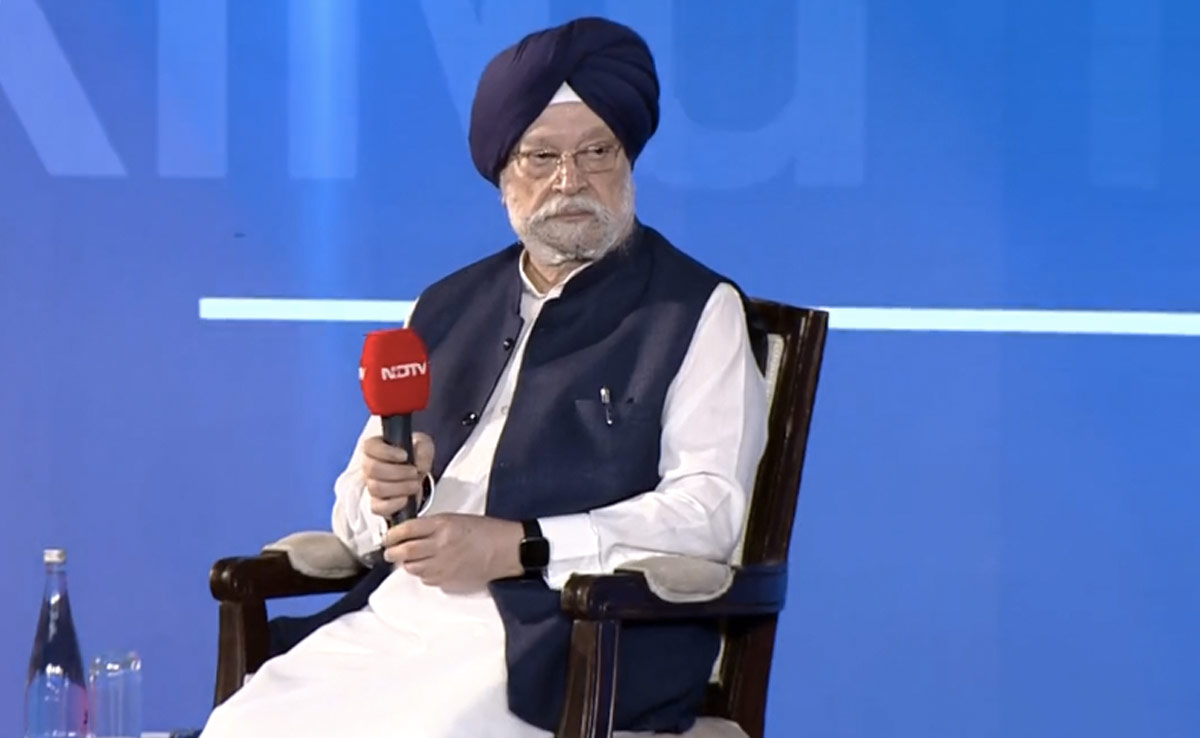
Rajat Dhawan, India Managing Partner, McKinsey: “The imperatives are applicable to G20, and for India, jumpstarting and accelerating is important. Over 2 billion people in the G20 global south live under the empowerment line. 75% of India’s districts have witnessed climate change. A sustainable and inclusive pathway is the way forward. Two goals for the next 10 years – half the amount of carbon emission and a large part of the billion population live below the empowerment line. Let’s drive growth and it will bring money.
Amitabh Kant, G20 Sherpa: “We have put the developmental agenda on the forefront, we’re not liable for the Ukraine conflict. Digital transformation on the planet is transferring away from innovation in US, and UK. India has demonstrated that you may create public sector layers on which non-public gamers can function and in India, knowledge is owned by the world. We have an open supply mannequin, API.”
Bob Sternsfel: “We’ve completed some analysis on deal with local weather change and we’d like 9 trillion {dollars} yearly to deal with local weather change.”
Raj Dhawan: “India has innovated in creating the general public digital infrastructure. Now 85% of individuals have financial institution accounts and from UID or Aadhar.”
Amitabh Kant: “Important for India to develop at 8-9% yearly for not less than three many years. We have to create jobs by way of manufacturing, urbanisation in a sustainable method, and enhancing agriculture. We’ll be the talent capital of the world and we have to practice them and that must be the primary precedence. As PM Modi mentioned, you possibly can relaxation assured that our G20 presidency will likely be decisive, and reflective and will probably be demonstrated.”
“Redefining from poverty to empowerment – we’re accustomed to the poverty line. Empowerment is about mobility. The actual aspiration must be to rise above the empowerment line and never the poverty line. When we increase our aspiration from poverty to empowerment we increase the challenges,” Bob Sternfels, Global Partner, McKinsey, mentioned.
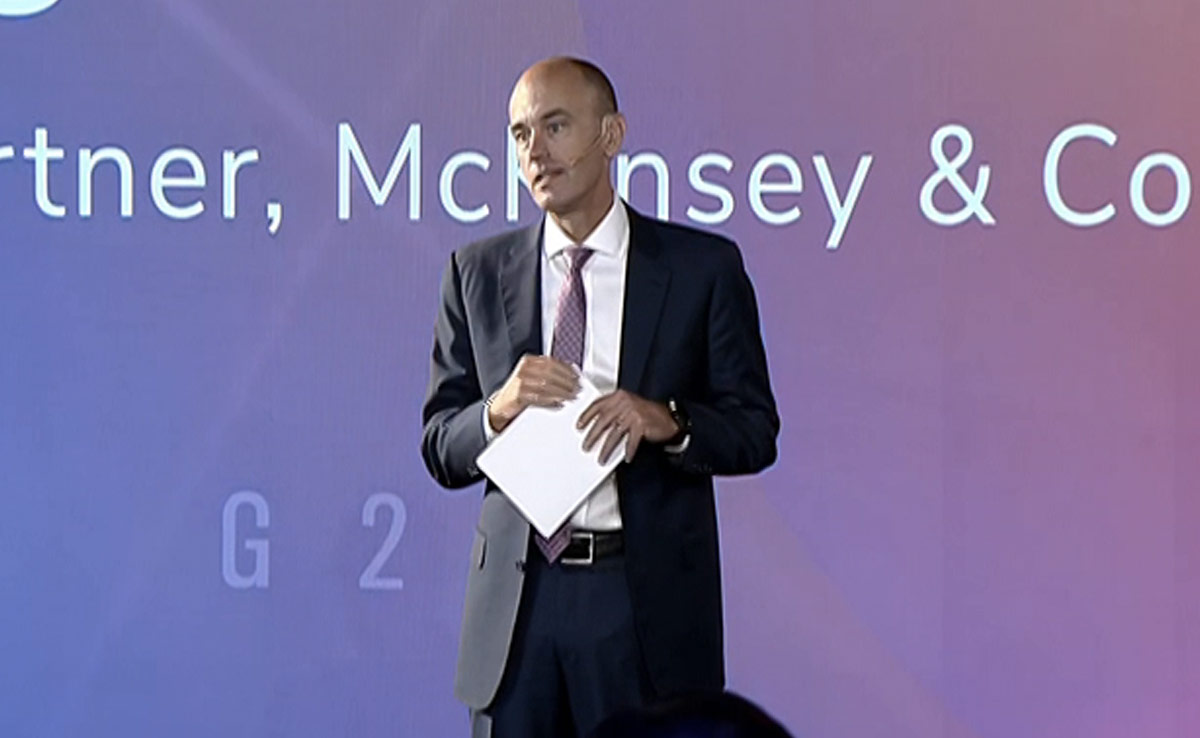 “I actually imagine that that is India’s century and our 2047 report says that India will develop by 8% yearly and ladies will likely be 60% of the workforce. 20% of world’s expertise is right here in India. Over 850 million web customers in India that lay the technological basis,” Bob Sternfels, Global Partner, McKinsey, said.
“I actually imagine that that is India’s century and our 2047 report says that India will develop by 8% yearly and ladies will likely be 60% of the workforce. 20% of world’s expertise is right here in India. Over 850 million web customers in India that lay the technological basis,” Bob Sternfels, Global Partner, McKinsey, said. “There has been no time in historical past when conflicts have come collectively – Climate adjustments, inequality, geo-political points, tech adoption, poverty,” he added.
“Climate motion is a precedence and we have now not carbonised the world however it’s incumbent on us to take motion. For each SDG and local weather motion, we’d like finance,” he mentioned.
“India is now the fifth largest economic system and aiming to turn into the third largest. We’ve supplied pipe water connection, we constructed bathrooms, throughout Covid vaccines to nearly 2.2 billion folks. In the final 7-8 years, we have now completed fairly phenomenal work. What we have achieved in seven years is what India usually would obtain in 50 years,” Mr Kant mentioned.
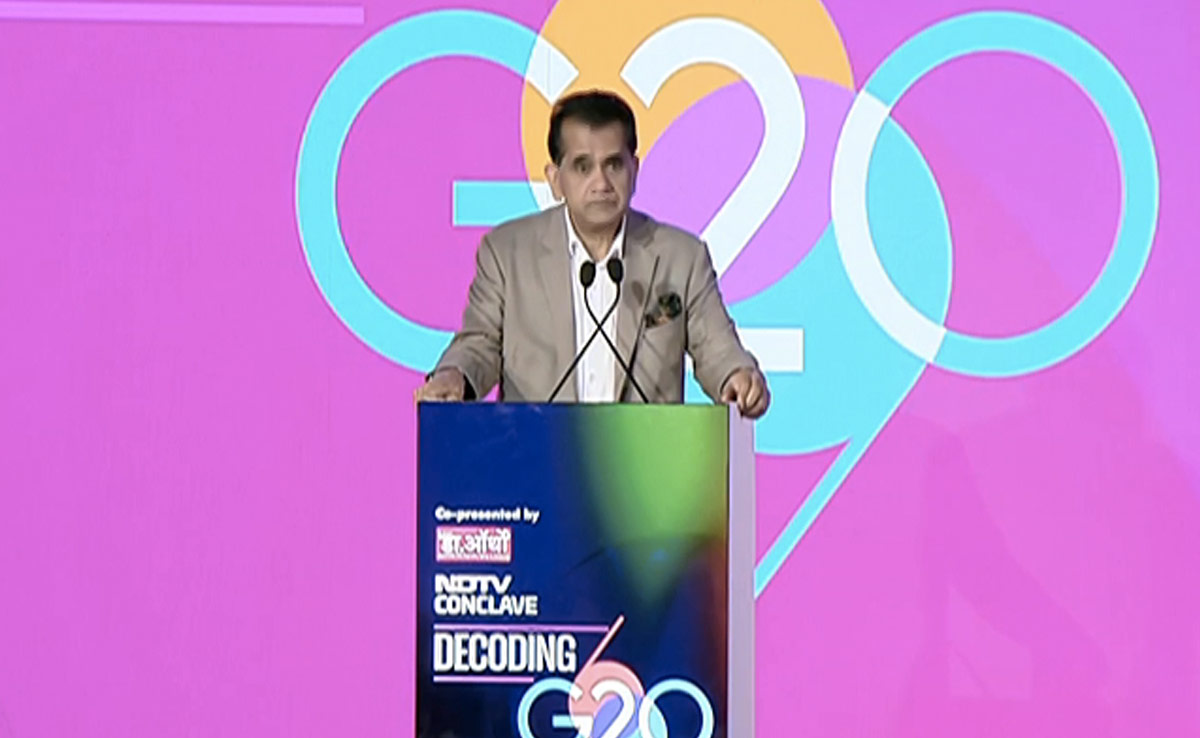
India’s G20 Sherpa Amitabh Kant begins his keynote address.
“The world is filled with challenges in the present day, however we in India, see these challenges as alternatives,” Mr Kant mentioned.
“We need to get out of the Khan Market, Lutyens Delhi tradition and transfer from the restricted sphere of considering. Since 2014, PM Modi has been saying that we have now to work for the folks of India and we are going to win elections due to our good work. Today, India will not be about what Delhi decides, in the present day it’s bottoms up and it is about what villages need and what the poor assume. It’s about taking the fruits of improvement to the widespread man,” he mentioned.
“We are all optimistic and the younger demographic profile of India in 30s will add 30 trillion {dollars} to India’s economic system within the coming years. We are going to convey convergence. Given PM Modi’s astute management and the recognition that he has amongst leaders, I’m assured we will convey one thing on geo-political points,” Mr Goyal said.
“Every single Indian, even within the remotest space, recognises India’s international place.”
#DecodingG20WithNDTV | Union Minister Piyush Goyal at NDTV Decoding G20 Conclave#NDTVDecodingG20#NDTVConclave#G20SpecialonNDTVpic.twitter.com/bMLx7JDOD0
– NDTV (@ndtv) August 26, 2023
“Ever since 2014, India performed an necessary position within the Paris summit and helped convey the world collectively and has performed an necessary position in international management and has been the voice of the worldwide south. PM Modi has earned the belief of India and that could be a defining issue of India’s management. Yesterday on the B20 summit, which is represented by 55 nations, we had 15 commerce ministers on one stage. India can convey various opinions on one stage and regardless of all of the challenges the world is dealing with, India introduced dimension to the world and helped redefine the potential of International commerce,” Union Minister Piyush Goyal mentioned.
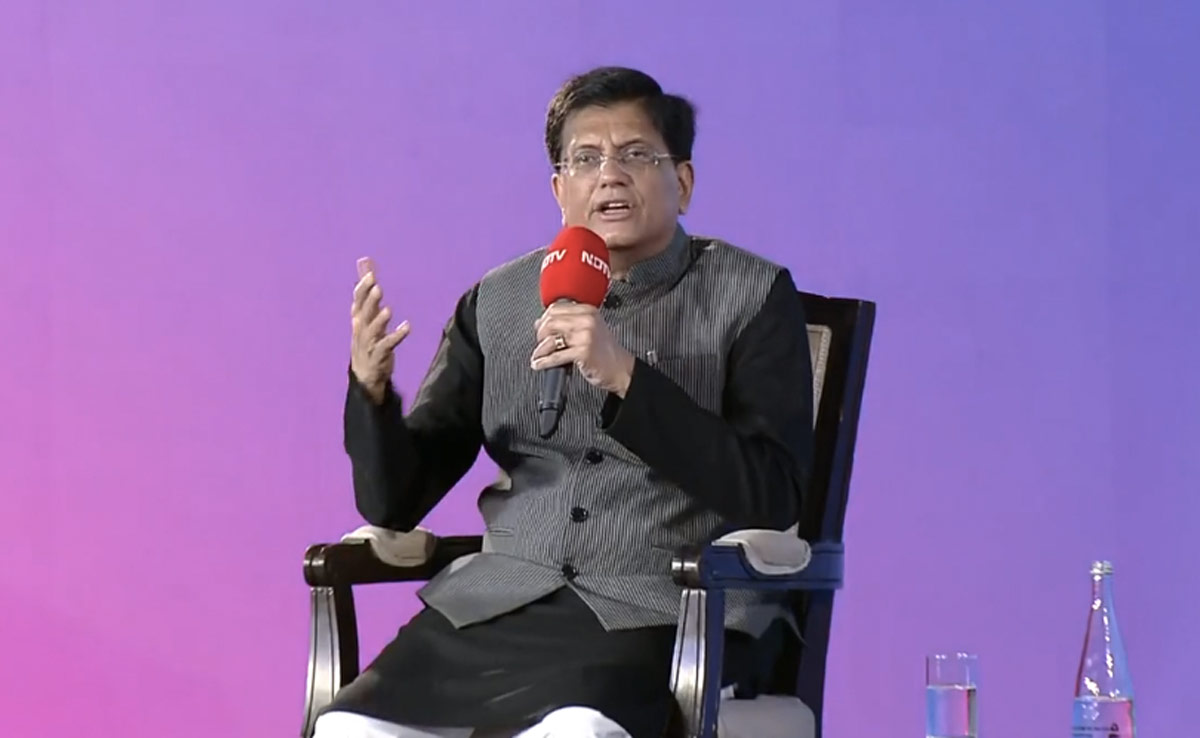
“It’s certainly a matter of nice delight that our scientists have taken us to the Moon in grand fashion and we are the first nation to land close to the moon’s south floor. It’s reflective of recent India and PM flew to Bengaluru to greet the scientists. The G20 leaders in Jaipur are in awe of India’s management. they’re India to convey inclusivity to convey higher good to mankind. I’ve little question that PM will present management to a world effort,” Mr Goyal mentioned.

[adinserter block=”4″]
[ad_2]
Source link